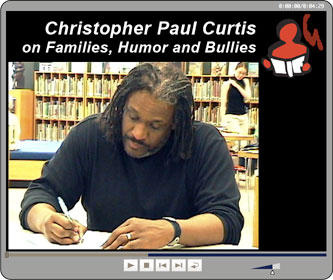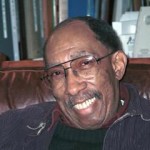National Recognitions Bestowed Upon Two Authors Featured in Originally Produced Interviews by TeachingBooks.net
Chief Joseph Medicine Crow, the 95-year-old author, historian, and storyteller, received the Presidential Medal of Freedom on August 12th from President Obama.
Anthony Browne was appointed as the United Kingdom’s sixth Children’s Laureate on June 9th.
…

 I was elected to the 2009 John Newbery Award selection committee by the membership of the American Library Association (ALA) division that administers this award, ALSC (Association for Library Service to Children). This was quite an honor, and a real shock to me. You see, I’m not a librarian. I’m a book lover. I’m a professional in the world of children’s books. But I’m not a librarian – and I always thought that librarians and academics in the field were those who got to serve on these committees.
I was elected to the 2009 John Newbery Award selection committee by the membership of the American Library Association (ALA) division that administers this award, ALSC (Association for Library Service to Children). This was quite an honor, and a real shock to me. You see, I’m not a librarian. I’m a book lover. I’m a professional in the world of children’s books. But I’m not a librarian – and I always thought that librarians and academics in the field were those who got to serve on these committees. In this post, I encourage you to bring authors into your classroom to add a personal dimension to social studies lessons. Autobiographical accounts, for example, can offer first-person perspectives on events under discussion. And authors who research and write about historical and cultural topics often present their interpretations and sources while revealing their methods and processes.
In this post, I encourage you to bring authors into your classroom to add a personal dimension to social studies lessons. Autobiographical accounts, for example, can offer first-person perspectives on events under discussion. And authors who research and write about historical and cultural topics often present their interpretations and sources while revealing their methods and processes. In this post I've highlighted summer's bounty with a smorgasbord of multimedia materials about books and authors that celebrate food. In her 2004 Charlotte Zolotow Lecture, Newbery Medalist Linda Sue Park commented that she didn't trust a character until she knew what they ate. I wondered, "Would she trust a character that was made of food?"
In this post I've highlighted summer's bounty with a smorgasbord of multimedia materials about books and authors that celebrate food. In her 2004 Charlotte Zolotow Lecture, Newbery Medalist Linda Sue Park commented that she didn't trust a character until she knew what they ate. I wondered, "Would she trust a character that was made of food?" I recently attended BookExpo America (BEA) in New York City. I feel very fortunate that I get to attend conferences like BEA, for a couple of reasons. First, because I think of myself as a reader, even more than a writer. I love to read, and the authors whose books I love are among my heroes. The big book conferences mean I have the chance to hear other authors speak, and sometimes I even have the thrill of meeting a writer whose work I really admire.
I recently attended BookExpo America (BEA) in New York City. I feel very fortunate that I get to attend conferences like BEA, for a couple of reasons. First, because I think of myself as a reader, even more than a writer. I love to read, and the authors whose books I love are among my heroes. The big book conferences mean I have the chance to hear other authors speak, and sometimes I even have the thrill of meeting a writer whose work I really admire. In this post, I offer a selection of online book-based activities that can be shared at home to further encourage family participation with literature and reading. Web sites offer a wealth of material that can stimulate discussions about books. Video and audio interviews with authors, for example, provide fresh insights about their work. Novel units, now available online, can guide conversations about books, making it possible for busy family members to know more about what their children are reading and to ask questions about particular books. The Internet’s potential to bring people and information together adds dynamic new possibilities to extend family involvement in reading.
In this post, I offer a selection of online book-based activities that can be shared at home to further encourage family participation with literature and reading. Web sites offer a wealth of material that can stimulate discussions about books. Video and audio interviews with authors, for example, provide fresh insights about their work. Novel units, now available online, can guide conversations about books, making it possible for busy family members to know more about what their children are reading and to ask questions about particular books. The Internet’s potential to bring people and information together adds dynamic new possibilities to extend family involvement in reading. One of the wonderful things about stories is their ability to allow us to explore and make believe. Whether as a reader or a writer, stories give us the chance to try on different hats. To see things from a new or different perspective. Or to share a bit of our own perspective with others.
One of the wonderful things about stories is their ability to allow us to explore and make believe. Whether as a reader or a writer, stories give us the chance to try on different hats. To see things from a new or different perspective. Or to share a bit of our own perspective with others. In this post, I invite you to introduce a multimedia dimension to your students’ series reading. Children love series fiction. They enjoy the familiarity of the storylines, become comfortable with the formulas, and delight in the characters’ idiosyncrasies. Educators appreciate that these titles are accessible to all children—from the voracious readers who never put a book down to the English Language Learners who build on the successful completion of one volume to move confidently on to the next.
In this post, I invite you to introduce a multimedia dimension to your students’ series reading. Children love series fiction. They enjoy the familiarity of the storylines, become comfortable with the formulas, and delight in the characters’ idiosyncrasies. Educators appreciate that these titles are accessible to all children—from the voracious readers who never put a book down to the English Language Learners who build on the successful completion of one volume to move confidently on to the next. 
 One of the burdens carried by children's literature is the expectation that it is supposed to be didactic, that it is supposed to teach a lesson. "What lesson do you want children to take away from your book?" is a question I get all the time about my children's books. Yet, I have never been asked that question about any of my books for adults.
One of the burdens carried by children's literature is the expectation that it is supposed to be didactic, that it is supposed to teach a lesson. "What lesson do you want children to take away from your book?" is a question I get all the time about my children's books. Yet, I have never been asked that question about any of my books for adults. In this post I’ve highlighted four specific literature-based activities that a substitute teacher can use to engage students—merging books, technology, and fun.
In this post I’ve highlighted four specific literature-based activities that a substitute teacher can use to engage students—merging books, technology, and fun. In this post, I highlight a few favorite Canadian authors and related online resources. I hope these multimedia materials connect you to these titles in fun, meaningful ways and prompt you to consider integrating them throughout your curriculum.
In this post, I highlight a few favorite Canadian authors and related online resources. I hope these multimedia materials connect you to these titles in fun, meaningful ways and prompt you to consider integrating them throughout your curriculum.